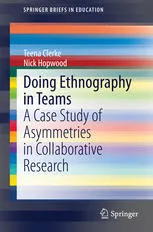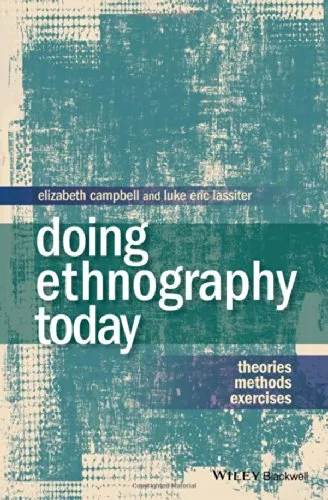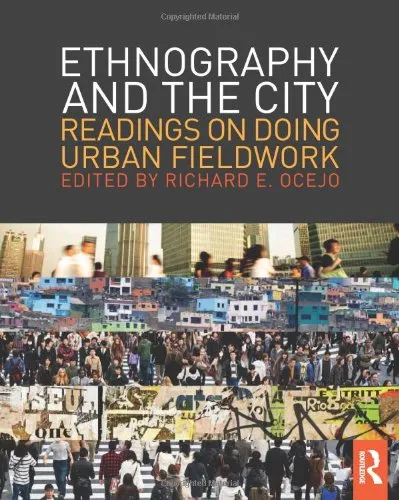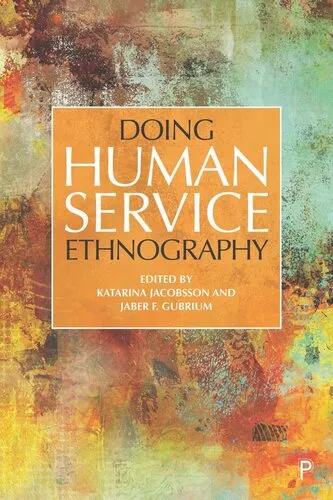’Doing’ Coercion in Male Custodial Settings: An Ethnography of Italian Prison Officers Using Force
4.0
بر اساس نظر کاربران

شما میتونید سوالاتتون در باره کتاب رو از هوش مصنوعیش بعد از ورود بپرسید
هر دانلود یا پرسش از هوش مصنوعی 2 امتیاز لازم دارد، برای بدست آوردن امتیاز رایگان، به صفحه ی راهنمای امتیازات سر بزنید و یک سری کار ارزشمند انجام بدینکتاب های مرتبط:
معرفی کتاب «’Doing’ Coercion in Male Custodial Settings: An Ethnography of Italian Prison Officers Using Force»
کتاب «’Doing’ Coercion in Male Custodial Settings: An Ethnography of Italian Prison Officers Using Force» تألیف لوئیجی گاریلیو، پژوهشی عمیق و انسانشناسانه در دنیای پیچیده و کمتر دیدهشده زندانهای ایتالیا است. این اثر به بررسی چگونگی اعمال زور توسط مأموران زندان در محیطهای مردانه پرداخته و از زاویه علمی و تجربی به چالشهای اخلاقی در این حوزه نزدیک میشود. با توجه به شیوه علمی و زاویه دید خاص نویسنده، این کتاب یکی از منابع اصلی در زمینه مطالعات خشونت و قدرت در محیطهای بسته محسوب میشود.
خلاصهای دقیق از کتاب
این اثر از طریق مطالعات میدانی و روش Anthropology موضوع استفاده از Coercion در زندانهای مردانه ایتالیا را مورد بررسی قرار میدهد. لوئیجی گاریلیو از روشهای Ethnography بهره برده است تا چگونگی مدیریت قدرت و زور را، که مأموران زندان ناچاراً یا عمداً اعمال میکنند، به تصویر بکشد. در این کتاب، نویسنده نه تنها به جنبههای فیزیکی اعمال زور میپردازد، بلکه به متغیرهای روانی، اجتماعی، و فرهنگی نیز نگاه دقیقی دارد. کاربردهای مفهوم Coercion در روابط انسانی و قدرت نابرابر یکی از محورهای کلیدی کتاب است که واقعیتهای گاه متناقض حرفه مأموران زندان را به نمایش میگذارد.
نکات کلیدی
- تحلیل دقیق روابط قدرت و خشونت در محیطهای بسته.
- بررسی روشهای غیرمستقیم اعمال زور و پیامدهای آن برای زندانیان و مأموران.
- شناخت فرهنگ سازمانی در زندانها و تأثیر آن بر اعمال Force.
- درک چالشهای اخلاقی که مأموران هنگام استفاده از زور با آن مواجه میشوند.
- اهمیت مسائل اجتماعی و نقش رفتار حرفهای مأموران در کاهش تعارضات داخل زندان.
نقلقولهای معروف از کتاب
"Coercion is not merely a tool; it is a language through which authority speaks and relationships are defined."
"The prison context amplifies every emotion, every confrontation, making Coercion both inevitable and deeply human."
چرا این کتاب اهمیت دارد؟
«’Doing’ Coercion in Male Custodial Settings» از اهمیت بسیاری برخوردار است چون به یکی از پیچیدهترین و گاه فراموششدهترین بخشهای جامعه یعنی زندان میپردازد. این اثر به بررسی اثرات بلندمدت اعمال زور بر روی انسانها میپردازد، خواه فرد استفادهکننده باشد و خواه قربانی. همچنین این کتاب برای افرادی که در حوزههای جامعهشناسی، روانشناسی، جرمشناسی و علوم سیاسی فعالیت میکنند، منبعی غنی و غیرقابل جایگزین است. اگر به دنبال درکی عمیق از روابط و قدرت در محیطهای خاص انسانی هستید، خواندن این کتاب به شما توصیه میشود.
Introduction
Welcome to a deep dive into the often-hidden dynamics of power, force, and control within the walls of male custodial institutions in Italy. ‘Doing’ Coercion in Male Custodial Settings: An Ethnography of Italian Prison Officers Using Force is a thought-provoking exploration of the nuanced and, at times, troubling world of prison life from the unique perspective of prison officers. This book is not only an ethnographic analysis but also a critical inquiry into the micro-dynamics of coercion and its implications on human interactions within the prison system.
Drawing from extensive fieldwork conducted in Italian male correctional facilities, this book provides an in-depth look at the lived experiences of prison officers and how they enact coercion. By bridging sociology, criminology, and ethnography, I aim to uncover the mechanics behind the authority exercised through force. This book goes beyond the simplistic narrative of good versus bad, offering a layered understanding of what it means to 'do' coercion in one of the most complex social settings—a prison. Through first-hand observations and interviews, this ethnography sheds light on the broader socio-political structures underpinning the prison organization while also spotlighting the personal and emotional struggles of prison officers.
Summary of the Book
The book is divided into carefully structured sections that trace the journey of understanding coercion in male custodial settings.
Starting from an overview of the Italian prison system, I contextualize the socio-legal framework within which these institutions operate. From there, the narrative delves into the specific practices of prison officers as they enact and justify the use of force. The ethnographic observations capture the officers’ routine interactions with inmates, providing a raw, unfiltered look at incidents where coercion becomes necessary—or, at times, excessive.
The core of the analysis lies in dissecting the tension between duty and humanity. Prison officers find themselves at a precarious intersection where maintaining order demands physical and psychological control, often clashing with their personal ethical boundaries. The book unpacks these moral dilemmas, vividly illustrating how institutional cultures shape their decisions and behaviors.
By the conclusion, the book moves beyond the empirical findings, offering a broader reflection on the nature of power and violence. It opens up avenues for critical discussions on prison reform, the mental health of correctional staff, and the ethical implications of force in custodial settings.
Key Takeaways
- Prison officers operate in environments where coercion is normalized, yet complicated by their personal identities and ethical stances.
- The use of force is not merely a procedural decision but is deeply embedded in institutional culture and power dynamics.
- Coercion in custodial settings reveals the tension between systemic control and individual empathy.
- Studying the micro-dynamics of prison interactions can shed light on broader societal structures of authority and resistance.
- Prison reform efforts must consider the lived realities of both custodial staff and inmates to create meaningful change.
Famous Quotes from the Book
"Coercion is not just the application of brute physical force—it is a finely-tuned performance of authority, a dance enacted in the shadows of security and fear."
"Prison officers may wear uniforms, but beneath them lie deeply conflicted individuals navigating ethical minefields daily."
"To understand coercion, one must step beyond the locked gates of the prison and grapple with the societal norms and systems that sustain it."
Why This Book Matters
In a world increasingly concerned about justice, human rights, and institutional accountability, this book invites readers to critically examine the role of coercion within the prison system. It matters because it tackles issues that are simultaneously urgent and often ignored. Prisons are microcosms of society, reflecting and amplifying broader dynamics of power, inequality, and resistance. By focusing on the experiences of prison officers—an under-researched demographic—this book fills a critical gap in academic literature.
Moreover, the global relevance of the themes in this book transcends its Italian context. The insights into coercion, institutional culture, and human rights resonate with audiences worldwide, emphasizing the need for systemic reform. By humanizing prison officers and capturing their moral dilemmas, this ethnography challenges simplistic narratives and encourages more nuanced discussions on justice and rehabilitation.
In summary, this book is not just an academic contribution but also a call to action—a plea to rethink the systems and cultures that shape our responses to crime and punishment.
دانلود رایگان مستقیم
شما میتونید سوالاتتون در باره کتاب رو از هوش مصنوعیش بعد از ورود بپرسید
دسترسی به کتابها از طریق پلتفرمهای قانونی و کتابخانههای عمومی نه تنها از حقوق نویسندگان و ناشران حمایت میکند، بلکه به پایداری فرهنگ کتابخوانی نیز کمک میرساند. پیش از دانلود، لحظهای به بررسی این گزینهها فکر کنید.
این کتاب رو در پلتفرم های دیگه ببینید
WorldCat به شما کمک میکنه تا کتاب ها رو در کتابخانه های سراسر دنیا پیدا کنید
امتیازها، نظرات تخصصی و صحبت ها درباره کتاب را در Goodreads ببینید
کتابهای کمیاب یا دست دوم را در AbeBooks پیدا کنید و بخرید
1263
بازدید4.0
امتیاز0
نظر98%
رضایتنظرات:
4.0
بر اساس 0 نظر کاربران
Questions & Answers
Ask questions about this book or help others by answering
No questions yet. Be the first to ask!














